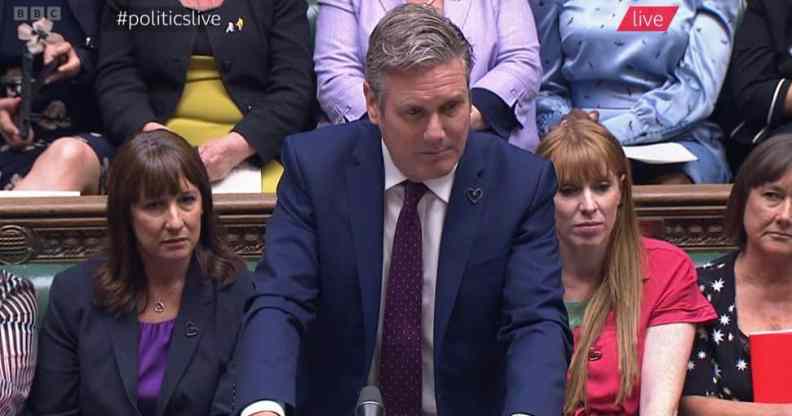Keir Starmer uses PMQs to pay tribute to Terry Higgins 40 years after he died from AIDS

Amid the turmoil engulfing the government, Keir Starmer paid tribute to Terrence Higgins. (Twitter)
Labour leader Keir Starmer delivered a touching tribute to Terrence ‘Terry’ Higgins, the first person named in Britain to die of an AIDS-related illness, during Prime Minister’s Questions (PMQs).
During a hotly-anticipated PMQs session on Wednesday (6 July), Starmer honoured Higgins against the backdrop of Boris Johnson battling a mutiny within his own party.
Higgins worked as a Hansard reporter typing up parliamentary reports in the House of Commons and moonlighted as a disc jockey at Heaven, London’s largest LGBTQ+ nightclub.
But on 4 July 1982 while at Heaven, a 37-year-old Higgins known for his charisma and love of astrology collapsed. He shortly passed away of AIDS-related illnesses.
It was a time when the word “HIV” didn’t even exist, the gap filled with fear and grief of a mysterious illness sweeping the queer community.
Now in the same chamber Higgins once worked in, the leader of the opposition joined backbenchers, Tory ministers and other MPs in honouring his memory.
“It’s also been 40 years since the death of Terrence Higgins Terrence worked at Hansard by day and Heaven by night before he sadly died of AIDS,” Starmer said, cutting through the laughter and taunts of the tense House.
“The Labour Party and the Terrence Higgins Trust have committed to ending new cases of HIV by 2030. Together we can.”
It's incredible to see @Keir_Starmer pay tribute to Terry Higgins, the first named person to die from AIDS-related illnesses in the UK.
40 years on and our work is very different — we're working towards ending new cases of HIV by 2030. We need those at the top standing with us. pic.twitter.com/5GaPr37Dzb
— Terrence Higgins Trust (@THTorguk) July 6, 2022
Scottish Nationalist Party’s Ian Blackford, who leads the party in Westminster, also led commemorations to Higgins and “all those who have died of AIDS”, he told parliamentarians.
40 years ago our namesake, Terry Higgins, lost his life to HIV. Thank you to @Ianblackford_MP, @theSNP Westminster leader, for honouring Terry's memory in the House of Commons today. @THTorguk pic.twitter.com/iiy5jrMcGM— THT Scotland (@THTScotland) July 6, 2022
Many MPs, including newly-appointed chancellor Nadhim Zahwai, wore heart-shaped pins on their lapels.
The badges are symbols for the Terrence Higgins Trust (THT), a decades-old HIV and sexual health charity named in honour of Higgins. To immortalise a man whose tragic death set into motion decades of medical leaps that now mean those living with HIV lead long, happy lives.
The words may have been brief, but the impact of lawmakers celebrating Higgins was felt among those who have dedicated their lives to fighting the virus.
“On a day when there was almost certainly heightened interest in Prime Minister’s Questions, it was great to hear both the leader of the opposition, Keir Starmer, and the leader of the SNP in Westminster, Ian Blackford, pay tribute to Terry Higgins,” says Matthew Hodson, the executive director of HIV charity NAM aidsmap who himself is living with HIV.
“The churn of the news cycle means it is easy for the continuing challenge of HIV to be overlooked. This is all the more frustrating when the power to end the HIV epidemic in the UK is within our reach.”
In 2019, the British government committed to ending the HIV epidemic, yet the government’s HIV Action Plan has yet to be properly financed even as It’s a Sin galvanised thousands to get testing.
Sexual health clinics, meanwhile, said the repeated lockdowns throughout the coronavirus pandemic presented Britain with a “once-in-a-generation opportunity” to curb the virus as cases plummeted.
Yet the government did not make the most of this. Scotland, however, could give England a roadmap to doing so, says Ewan Summersbey, the gay officer for the SNP’s LGBTQ+ wing, Out for Independence.
“Scotland has been no less challenged by HIV than the rest of the UK,” he says. “Much has been done in Scotland to improve our response and improve the quality of life of people living with HIV.”
He pointed to Scotland’s roll-out of pre-exposure prophylaxis, an HIV-preventive pill otherwise known as PrEP, as one example of this. The publicly-funded programme launched in 2017 and led to a sharp fall in HIV cases – England and Wales followed some three years later.
“Scotland was a leader in ensuring the availability of PrEP to those who needed it, moving at a quicker pace than the rest of the UK to do so,” Summersbey says.
“Looking ahead, the commitment in Scotland to the elimination of HIV by 2030 through our four Fast Track Cities is clear,” adding the plan has the full backing of the SNP government.
For Richard Angell, the THT’s campaign director, it was “remarkable” that Starmer and Blackford paused to reflect on how the death of Higgins changed the course of British history.
“It shows the special place Terry, and the organisation set up in his name, has with the public at large and the people who can make possible the 2030 goal to end new cases by HIV,” he says.
“Our past inspires even great focus on the job still to be done to fight stigma, help those living with HIV and have zero new transmissions within this decade.”

